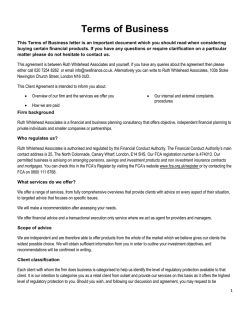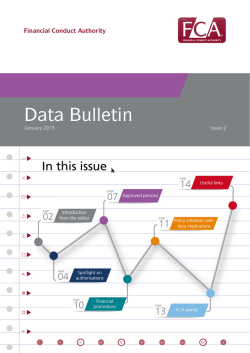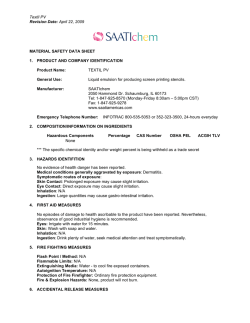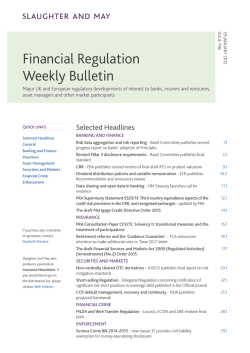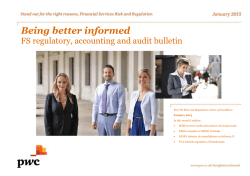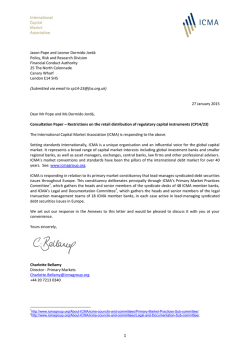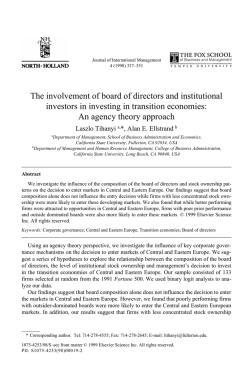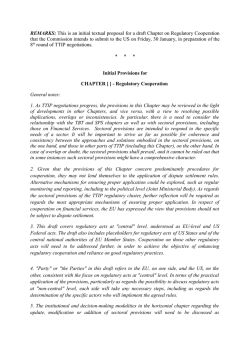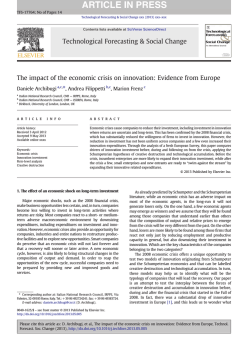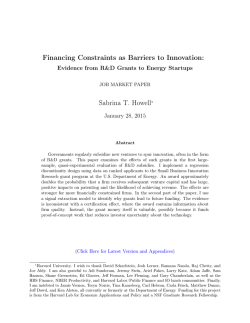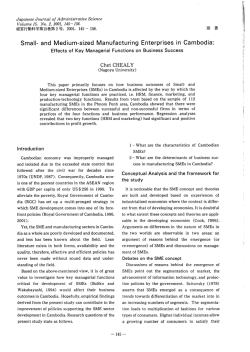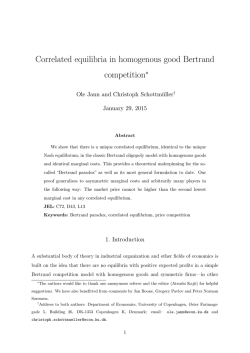
View PDF - Legislation.gov.uk
EXPLANATORY MEMORANDUM TO THE FINANCIAL SERVICES AND MARKETS ACT 2000 (MISCELLANEOUS PROVISIONS) ORDER 2015 2015 No. 1. This explanatory memorandum has been prepared by HM Treasury and is laid before Parliament by Command of Her Majesty. This memorandum contains information for the Joint Committee on Statutory Instruments. 2. Purpose of the instrument 2.1 This instrument makes provision in connection with the transfer of consumer credit regulation from the Office of Fair Trading to the Financial Conduct Authority which is effected by the Financial Services and Markets Act 2000 (Regulated Activities) (Amendment) (No.2) Order 2013 (S.I. 2013/1881), and the Financial Services Act 2012 (Consumer Credit) Order 2013 (S.I. 2013/1882). 3. Matters of special interest to the Joint Committee on Statutory Instruments Section 55C of the Financial Services and Markets Act 2000 (c.8) (“FSMA”) is a power to amend Parts 1 and 2 of Schedule 6. Here it is used to amend paragraph 2G of Schedule 6, which is contained within Part 1B. We think that section 55C gives the necessary vires for the following reasons. Section 55C FSMA was inserted by the Financial Services Act 2012 (“the 2012 Act”) and states that the Treasury has power to amend Parts 1 and 2 of Schedule 6 of FSMA by order, subject to the affirmative resolution procedure. When section 55C was inserted into FSMA, Schedule 6 contained three Parts – Part 1, Part 2 and Part 3. The clear intention was to allow the opportunity to amend Schedule 6, save for Part 3. The power in section 55C was exercised in Financial Services and Markets Act 2000 (Threshold Conditions) Order 2013 (SI 2013/555) (“the Threshold Conditions Order”), which substituted a new Part 1 and new Parts 1B to 1G for the old Parts 1 and 2. There is no longer a Part 2. The Threshold Conditions Order was made to fulfil a duty contained in paragraph 5 of Schedule 20 to the 2012 Act, requiring the Treasury to make an Order under section 55C which “amends or replaces Parts 1 and 2 of Schedule 6” by a certain date. The original purpose of section 55C was to provide a mechanism to amend the threshold conditions, which are set out in the Schedule, save for the specific paragraph in Part 3. Though the Threshold Conditions Order amended and rearranged the threshold conditions into different Parts, the purpose of the new Parts is identical to the purpose of the original Parts 1 and 2, in that they continue to set out threshold conditions for different regulated activities. We take the view that the power to amend Parts 1 and 2 should be interpreted as including a power to amend any provisions substituted for those Parts. This interpretation would be in keeping of the intention of Parliament, and would make sense of the purported power to amend a Part which no longer exists. The scope of the power needs to be assessed by reference to Schedule 6 to FSMA at the time when section 9 was enacted, rather than subsequently in the light of the changes made by the Threshold Conditions Order. It is also consistent with what the Treasury told the Delegated Powers and Regulatory Reform Committee in its memorandum in 2012 about the intended effect of the powers conferred in the new section 55C, to be inserted by clause 9 of the Financial Services Bill (which became the 2012 Act), and consistent with the Committee’s understanding as recorded in paragraph 15 of its report on that Bill. 4. Legislative Context 4.1 FSMA and the Financial Services and Markets Act 2000 (Regulated Activities) Order 2001 (“S.I. 2001/544”) (“the Regulated Activities Order”) were extended to cover consumer credit regulation by the Financial Services and Markets Act 2000 (Regulated Activities)(Amendment) (No 2) Order 2013 and the Financial Services Act 2012 (Consumer Credit) Order 2013. This Order makes further amendments to the threshold conditions applying in relation to relevant credit activity under Schedule 6 to FSMA; to the exemptions provided for in relation to regulated credit activity under the Regulated Activities Order, and to the Financial Services and Markets Act 2000 (Financial Promotion) Order 2005 to clarify the way in which that Order applies in relation to credit activity. 5. Territorial Extent and Application 5.1 6. These instruments apply to all of the United Kingdom. European Convention on Human Rights 6.1 The Economic Secretary to the Treasury has made the following statement regarding Human Rights: In my view the provisions of the Financial Services and Markets Act 2000 (Miscellaneous Provisions) Order 2014 are compatible with the Convention rights. 7. Policy background 7.1 This instrument makes provision in connection with the transfer of consumer credit regulation from the Office of Fair Trading (“OFT”) to the Financial Conduct Authority (“FCA”) as follows: 8. • To extend the scope of the limited permission regime in relation to ‘domestic premises suppliers’, credit broking when referring customers to third party hire purchase brokers and credit broking in relation to the hire of any goods. • To exempt solicitors or other qualified legal practitioners who carry out those activities in the course of carrying out or preparing for litigation or advocacy in the courts from the need to have authorisation from the FCA (this is because they are already regulated by their professional bodies). • To amend the definition of ‘payment’ to clarify that for the purpose of determining which sorts of agreements are exempt from FCA regulation, the meaning of “payment” is not just a payment which repays capital. It is any payment which includes any part of the total charge for credit, including any interest or charges. • To carry forward the existing ‘anti-abuse’ provisions of the Consumer Credit Act in relation to the business lending exemption or the high net worth exemption to avoid firms setting an artificially high credit limit in running-account agreements, to take advantage of these exemptions and evade regulation • To clarify that any item which forms part of the total charge for credit (as defined by FCA rules) is not itself to be treated as credit even if it is not immediately payable. This means that each time a lender imposes a charge, it is not additional giving of credit and therefore not a regulated activity. • To clarify how the prohibition on financial promotion applies to certain communications by insolvency practitioners. Consultation outcome 8.1 Several of the issues addressed by this instrument are only minor drafting amendments. Other provisions within the instrument are being made to resolve issues identified by the FCA in the course of their review of applications for authorisation relating to consumer credit activities. There is no statutory requirement to consult, and given the need to address the issues concerned before significant numbers of affected firms are required to apply for full authorisation, it was felt appropriate to conduct an informal consultation. The FCA were consulted on all aspects of the draft Order, and are content with the final drafting. A number of consumer credit stakeholders were consulted on particular provisions, including the Solicitors Regulation Authority (SRA), the Law Societies of England and Wales, Scotland and Northern Ireland, and the Department of Enterprise, Trade and Industry (DETI) on the issue regarding legal practitioners. Some concerns were raised (for example, in relation to the need to ensure that the exemptions for solicitors and qualified legal professionals worked in relation to each of the different regulatory arrangements for lawyers in each of the devolved nations). These concerns were addressed by amendments to the drafting. 9. Guidance 9.1 10. Further guidance will be made available by the FCA. Impact 10.1 The impact on business, charities or voluntary bodies of the transfer of consumer credit regulation from the OFT to the FCA is set out in the accompanying impact assessment. The Government’s best estimate of the total cost to business of the new regulatory regime is £336 million over 10 years (at 2013 prices). The Government’s best estimate of benefits of the regime is £689 million over 10 years. The estimated net benefit over 10 years is £353 million. 10.2 The impact on the public sector is not quantified as public sector organisations generally do not undertake consumer credit activity, apart from local authorities which offer certain types of unsecured credit agreements. 10.3 An Impact Assessment is attached to this memorandum and will be published alongside the Explanatory Memorandum on www.legislation.gov.uk. 11. Regulating small business 11.1 The legislation applies to small business. 11.2 To minimise the impact of the requirements on firms employing up to 20 people, the regulatory regime for consumer credit has been designed so that small firms will be subject to proportionate and manageable burdens: • • • • • • Many small firms will be able to take advantage of the limited permission regime which will impose lower costs and reduced administrative requirements on eligible firms; Small firms (except lenders which apply interest and charges to loans) will have the option to become an appointed representative, as a way for smaller firms to operate without having to shoulder the burden of direct authorisation and regulation; Consumer credit firms will not be subject to minimum capital requirements (except where they undertake debt management business); Existing exemptions from regulation for agents of mail order firms and home credit providers will continue; Firms which specialise in finding or tracing individuals, where these are not carrying on a financial services business will be removed from the scope of regulation; and In addition, the FCA proposes to introduce a differentiated fee charging system, which will reflect the size of firms. 11.3 The basis for the final decision on what action to take to assist small business is ensure that small businesses gain from the reputational benefits of a better-regulated and well-functioning market and to ensure that small businesses are subject to appropriate and proportionate regulatory burdens. The Government has decided against exempting small business from this policy, as its objective is to strengthen consumer protection across the consumer credit market. 12. Monitoring & review 12.1 HM Treasury will monitor the practical effects of the Order to ensure it continues to meet the policy aims. The FCA will also review the operation of the regime for regulation of consumer credit, including the operation of the relevant provisions of the statutory instruments amended by this Order. 13. Contact 13.1 Alastair Jones at HM Treasury (tel: 0207 270 6093 or email: [email protected]) can answer any queries regarding the instrument.
© Copyright 2026

